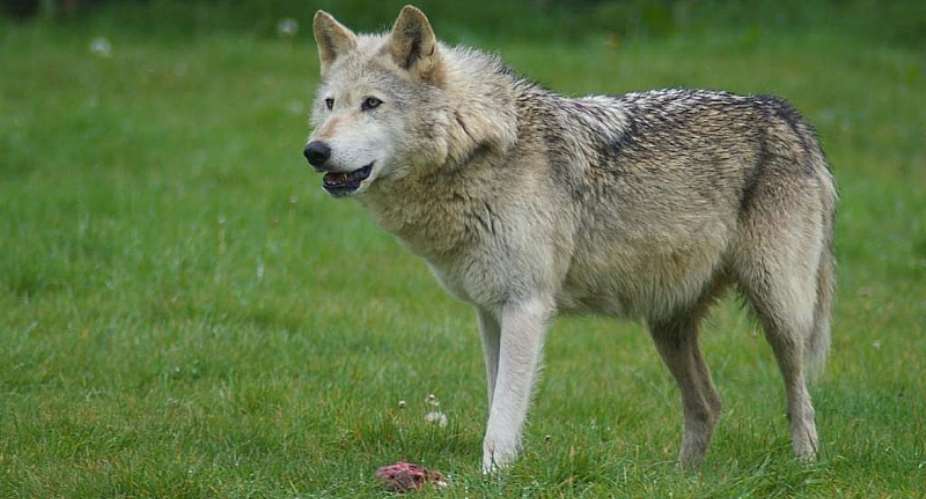There's a problem with wolves in France, according to left-leaning newspaper, Libération. The French grey wolf population was wiped out in the 1930s, and made a slow natural return from Italy in the course of the 1990s. But some say there are now too many, and are calling for a cull.
Despite a rapid installation of the French returnees, the animal is still considered endangered by the International Union for Nature Conservation. There are currently 530 individual wolves living in France, that's thirty more than the limit established under the so-called “Wolf Plan,” which last year set the minimum viable population at 500.
The problem is that, while the protection people are delighted, local farmers, especially those who leave their sheep to graze on upland Alpine pastures, are less so, because the wolves, naturally enough, see the sheep as dinner.
In the wake of an increasing number of attacks on flocks, the French authorities have decided to increase the number of wolves that can be killed, from 12 percent last year to 19 percent in 2019. The conservationists say that's too high and will endanger the survival of a supposedly protected species.
The farmers are delighted, having already shot 52 of the 53 animals allowed to be culled under last year's regulations. They say the increase, which will lead to the deaths of between 90 and 100 wolves, was urgently needed.
State Council to be asked to decide on death sentence
So the pro-wolf lobby have decided to ask the State Council, which works out the administrative details of French law, to cancel the increase in the number of death sentences issued.
The good, green animal lovers say this level of slaughter will put the survival of the species at risk; the State Council has already refused several previous requests for a reduction of the legal number of wolves to be culled.
The director of the French Bird Protection League (I'm not mixing my notes here, for once; the bird people are also fond of wolves) says the government's policy is clearly to kill more and more wolves. And that there's no real effort to encourage a peaceful coexistence between humans and the predators.
“The figures won't stand up to scientific examination,” says the birdman. “We are looking at a real risk that the wolf population will be eroded to an unreasonable level.”
The problem is that “reasonable” means different things for the wildlife confraternity and for the sheep farmers.
There is one final complicating factor: the rules for the numbers culled are relaxed in certain localities, notably those which have experienced 15 or more attacks in the past 12 months.
The cullers think that's a fair reaction to the situation on the ground. The more you are attacked, the harder you can defend yourself.
Unfortunately, the wolves can't count and they don't respect parish boundaries.
The battle is far from over. And as for the war…
The politics of the empty chair
Turning to Le Monde, the problem is bears.
Last week, 61 sheep fell from a cliff in the Pyrenees. Local farmers say they were chased to their deaths by a bear. Four weeks earlier, another bear is suspected to have been the unwitting assassin of a flock of 250 sheep in a neighbouring community.
For the first time in 20 years, the herders boycotted the recent presentation of new suggestions by the state for a more stable relationship between sheep farmers and sheep-eaters.
For their own very different reasons, the green groups also boycotted the meeting, meaning that the government officials were left talking to a room full of empty chairs.
The farmers think the bears are getting away with murder; the ecologists say the plan to scare certain individual animals considered as dangerous higher into the mountains is cruel, unnatural and dangerous. The sheep are reserving their position. But a spokeswoman bleated 'Baah, we're worried'.
Cars have been burned, threats exchanged, insulting letters delivered.
In an attempt to calm the various parties, the government has promised to simplify compensation to farmers who suffer losses provoked by bears, wolves or lynx. Farmers will get 600 euros for every milk-producing animal killed, provided the farmer has taken reasonable steps to protect his flocks from attack.
There are reckoned to be about forty brown bears in the southern French mountains, following the reintroduction of the species about three decades ago.





 There’s nothing you can do for us; just give us electricity to save our collapsi...
There’s nothing you can do for us; just give us electricity to save our collapsi...
 Ghanaian media failing in watchdog duties — Sulemana Braimah
Ghanaian media failing in watchdog duties — Sulemana Braimah
 On any scale, Mahama can't match Bawumia — NPP Youth Organiser
On any scale, Mahama can't match Bawumia — NPP Youth Organiser
 Never tag me as an NPP pastor; I'm 'pained' the 'Akyem Mafia' are still in charg...
Never tag me as an NPP pastor; I'm 'pained' the 'Akyem Mafia' are still in charg...
 Your refusal to dedicate a project to Atta Mills means you never loved him — Kok...
Your refusal to dedicate a project to Atta Mills means you never loved him — Kok...
 2024 elections: I'm competent, not just a dreamer; vote for me — Alan
2024 elections: I'm competent, not just a dreamer; vote for me — Alan
 2024 elections: Forget NPP, NDC; I've the Holy Spirit backing me and nothing wil...
2024 elections: Forget NPP, NDC; I've the Holy Spirit backing me and nothing wil...
 2024 elections: We've no trust in judiciary; we'll ensure ballots are well secur...
2024 elections: We've no trust in judiciary; we'll ensure ballots are well secur...
 Performance tracker: Fire MCEs, DCEs who document Mahama's projects; they're not...
Performance tracker: Fire MCEs, DCEs who document Mahama's projects; they're not...
 Train crash: Railway ministry shares footage of incident
Train crash: Railway ministry shares footage of incident
